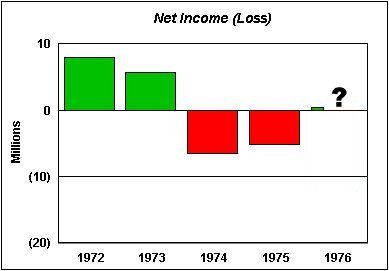RECESSION & THE LOSS OF MARCO PRODUCT - 1973 TO 1976
The second decade of Deltona began with the same optimism that marked the previous decade.
On April 28th of 1973 Deltona's fourth the master planned retirement community - Marion Oaks - opened.
Marion Oaks, located in the heart of Florida's "horse country", encompassed 15,000 acres of gently rolling, oak covered property about 18 miles south of Ocala and right off of Interstate 75. Twenty four thousand home sites were drawn into the master plan as well as all of the commercial property, church sites, school sites and other amenities required for a future city of sixty thousand people.
The master plan included two golf courses and a gorgeous recreation center in the middle of a densely wooded part of the property.
Initial sales were excellent. In the first eight months approximately twenty million dollars of real estate were sold!
In 1973 the Deltona's last major property acquisition occurred in a deal with Ben Hill Griffin for 15,700 acres of land in Polk County including two miles of frontage on beautiful Lake Arbuckle which itself was part of the Kissimmee chain of lakes and rivers running through central Florida.
The western boundary of the property was Highway 27. The Polk County property was about 17 miles south of Lake Wales and about 60 miles south of Disney World.
The Polk County property and the Tampa property were the home of abundant game and for many years were a favorite camping and hunting site for a few Deltona people who were so inclined.
Acreages held in inventory - well over 100,000 across Florida by now - were usually managed by agricultural lease-holders. The properties were used as cattle ranches, some orange groves and timber raising. The agricultural operations allowed us to maintain agricultural exemption on the property - saving us in property taxes. The local tenants also provided some security for the property. Most of all they were - invariably - avid sportsmen who - in hunting season - organized their own private deer, hog and bird hunts. They were always inviting us to join in - and we often accepted!
As the year 1973 went on the dark clouds were beginning to form. There were a number of factors - all beyond the control of the Mackle organization - that would negatively affect the company.
Inflation which was not a significant business consideration when I joined the company had average 2.5% during the decade of the 60s. In the year prior to the opening of Marion Oaks inflation had risen to 5.1%.
By the end of 1973 it would be at 8.7%
To combat inflation the Fed drove the prime rate which was 6.6% in April 1973 to 9.7% by the end of the year.
At the end of October 1973 -with inflation and the prime rate on the rise - there occurred the most serious and unexpected single economic event of my lifetime - the Arab Oil embargo.
In spite of the mounting difficulties 1973 was still a reasonably good year. Revenue actually increased from $128 million in 1972 to $138 million in 1973. Profits however were down 28% at $5.8 million versus $8 million the year before. However that was measured against a record year so 1973 was still quite respectable. The drop in profits being blamed primarily on the rising interest costs.
At the end of 1973 the company was still optimistic enough and to explore a fascinating new possibility - that of a timber company to harvest lumber in the remote jungles of Honduras.
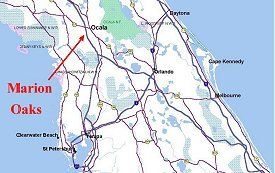
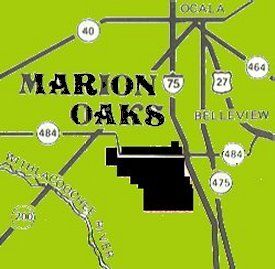
Locator Map

Marion Oaks Entrance

Marion Oaks Recreation Building
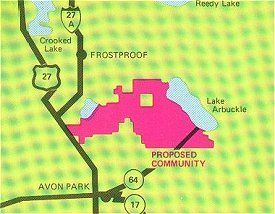
Polk County Property
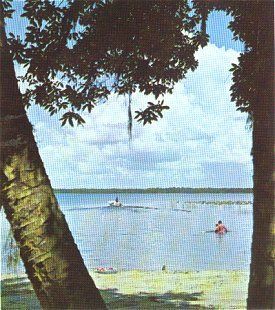
Lake Arbuckle
Polk County Property
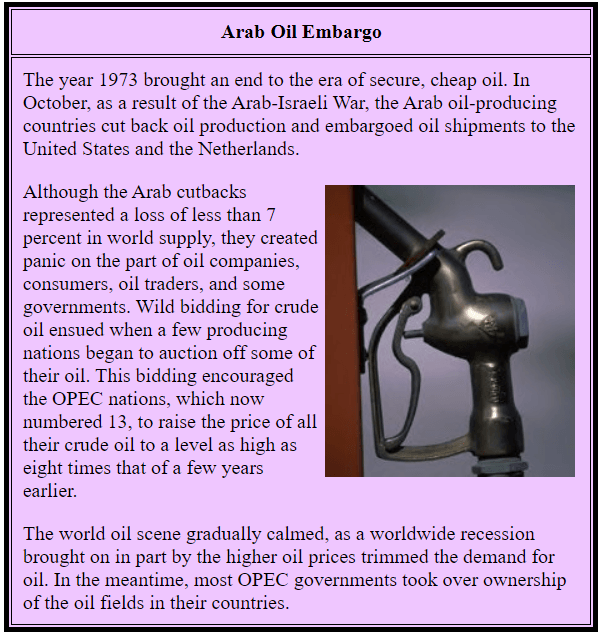
Deltona Lakes Early 1963
The Honduras Adventure
Bill Delph - always looking for new sources of supply - had been purchasing lumber from the Central American country of Honduras. From his contacts and those of Jack Peeples an opportunity emerged to invest in a timbering operation there.
The Honduran government had about 400,000 acres available which had never been timbered. They were interested in joint venturing with us.
Over several months in 1973 Deltona - through its Imperial Lumber subsidiary - sent lumber experts into this remote region to assess the quantity of lumber and type of forests that were available. The lumbermen were housed in several railroad cars that United Fruit kept on hand for visitors to their banana farms in that part of Honduras.
A relative of Jack Peeples, a character named Billy Leighty, was familiar with Honduras. He had been a commercial pilot in Central America and now lived on Roatan, a small island and diving haven just off the coast from the timberlands. Billy joined the adventure as the pilot of a single engine plane based near the railroad train.
Also brought in to the endeavor was a helicopter whose pilot had flown in Viet Nam.
Each day the timber crews were taken by helicopter to another remote part of the property. There they discovered huge - but un-managed - stands of pine. Also surveyed were ancient stands of huge mahogany trees and other exotic woods in the deep ravines formed by the clear rivulets that tumbled down the mountains.
I and a few other Deltona executives spent a few days with the timber crews in the Honduran forest.
The potential was enormous.
Preliminary plans were discussed. The undertaking would require the set-up of all of the necessities of life as there were literally none existent in the area. Housing, roads, water supply, food supply, electric power .... everything ....would have to be created from scratch to harvest the lumber and ship it to the port.
It was all possible however.
Inquiries were being made to the U.S. government for assistance including venture insurance that was available at the time for such off-shore investments.
The Honduran government was already in two other timbering ventures in other parts of the country. The Honduran law requires such ventures to be done with the government owning 51% and their partner 49%. About the time of our explorations the Honduran government discovered that their partners were "laundering" the partnership profits. Honduran officials confiscated the operations and sought the arrest of their former partners. Then they turned to us and asked us to manage their entire lumber industry!
That turn of events demonstrated what dealing with a Central American government was like. That and the difficulties that were mounting back home caused us to abandon any further efforts.
It was a fascinating episode however.
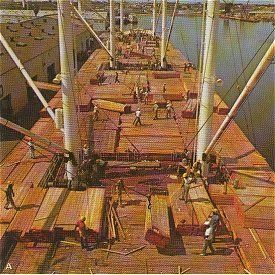
Deltona Lakes Early 1963
Closer to home the countless and continuing delays in obtaining the necessary Marco dredge and fill permits from the state and federal authorities finally forced a much discussed and avoided decision.
At of the beginning of 1974 we decided to take all Marco lot inventory off the market. Property which as recently as 1971 had amounted to 38% of all land sales - was no longer available to the sales force. For the sales representatives it was like taking a 38% cut in pay - and for the many Marco sale specialists it was devastating.
For Deltona, the loss of Marco inventory began to affect earnings. Land sales were down. With interest rates at historic highs - housing sales began to slide as well. In the fourth quarter of 1974 housing sales dropped to $4,118,000 from 10,835,000 in the prior year. At the end of the year housing backlog of sold but undelivered units stood at $14,800,000 down from 25,400,000 a year earlier.
And by the year end the company recorded its worse year - and first losing year - in its history. Revenues for 1974 were down 22%. And losses totaled $6,500,000.
Drastic measures to address the situation needed to be taken.
Staff was eliminated.
Management salaries were cut.
Even the year's annual report - usually a proud symbol of success and the company's Florida products - was cut to the bones as a two color limited edition.
In October of 1974, because of the deteriorating situation, the company began to think about selling off some of its land inventory. Neil Bahr - architect of Deltona's marketing operation - was named President of Deltona Land and Investment Corporation (D.L.I.C.) and given the task.
The year 1975 was a continuation of the impacts if high interest rates and lack of Marco inventory.
More strategies were put in place to deal with the situation.
The Manufactured Homes Division had the potential of producing a home at a lower cost than site built operations. But volume was required to amortize the high fixed plant costs. With the falling demand for houses it was decided - early in the year - that Manufactured Homes Division be shut down and the company returned exclusively to site building homes. The two manufacturing facilities were placed on the market and sold.
Early in the year the Company - under Dad's direction - went "Back to Basics" and introduced a "no frills" housing line at a lower cost than either the manufacturing or the site building operation had been offering.
The efficiency and simplicity of the nineteen fifties were re-introduced to the 1970s.
The product was an immediate success.
And the country was ready for some belt tightening.... the publicity surrounding the strategic turn was substantial.
The sales of single family home were up 10% in 1975. More importantly gross profit margins on single family housing were up from 10.2% in 1974 to 17.2% in for all of 1975 and nearly 23% in the last six months of 1975.
Imperial Lumber Company - seeing declines in the Florida construction products markets began looking offshore for healthier markets. Resulting from this effort were exploratory trips to Lybia, Lebanon, Iran, Kuwait and Saudi Arabia. Significant sales of component homes and specialty millwork products were made in Iran and Saudi Arabia.
In June 1975 I was named Executive Vice President. Up until that time I had been on the Construction and Development side of the business. From then on my role put me over all operating areas of the company. I answered to Bill O'Dowd, Senior Executive Vice President and Chief Operating Officer and he reported to Dad who was President and Chief Executive Officer.
At year end - in spite of the counter-measures - results were not good. Land Revenues and profits were down due to the economy and the lack of Marco inventory. And in 1975 the Company reported its second losing year in a row with a loss of $5,100,000.
Trying to put the best "face" on it Dad's Letter to Stockholders noted a reduction in interest expenses due to reduced debt and lower average interest rates, the success of the "Back to Basics" homes with a 10% increase in single family home sales and the fact that the losses - a large as the were - were still better than the prior year.
Despite the two years that preceded it 1976 began with a few reasons to be optimistic.
The recession was over.
The Dow was back over 1,000 early in the year.
The Prime rate was below 7.0 by February.
And the company was in discussions with its banks to take over - on a very lucrative fee basis - the management of one of its "work out" properties, the community of Rotunda on the west coast of Florida.
The deal to manage the project was concluded in February, 1976.
Deltona's stock price had risen from a low of 3.25 in the fourth quarter of 1975 to a high of 7.625 in the first quarter of 1976!
Dad reported 1976 a first quarter profit of $99,000. Not very much. But after losses of six and a half million dollars in 1974 and five million dollars in 1975 it was reason for optimism!
And it was confidently believed that a decision would coming soon from the Corps of Engineers. There was no doubt that the decision would be in the company's favor. It was just a matter of waiting for the federal bureaucracy to "do its thing."
But it was not to be.
I remember it well.... the same way I remember the Kennedy assassination.
I was returning from a trip up-state on the company's King Air. Ray Anderson, chief pilot of the corporation, was at the controls. When we arrived at the airport he said he had gotten the news that the company's stock had been suspended from trading as it had been announced that the Corps of Engineers would be issuing their decision within 24 hours. It was and is routine for stock trading to be suspended in such a situation. And the news was greeted with elation.
It was finally over!
We could get on with our business!
Happy times were here again!
For Deltona employees - while there was always liquor on the plane for VIPs - it was unheard of to partake while we were working - and you were working until you got off the plane - or beyond.
Nevertheless we made an exception than night. Bottles were opened and toasts were made!
I went back to the office before going home.
There was no joy in Dad's office.
They had just received the news.
MARCO PERMITS ARE DENIED!
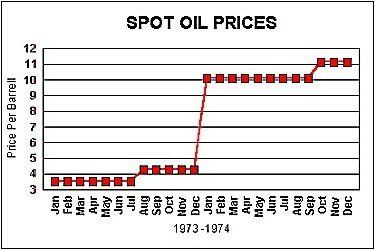
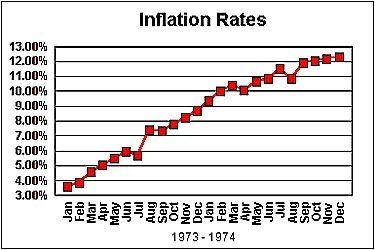
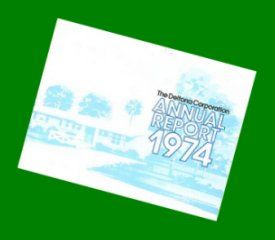
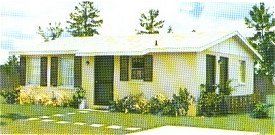
No-frills Colleen Model
$18,600
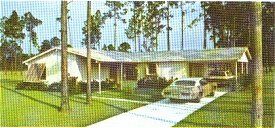
No-Frills Helen Model
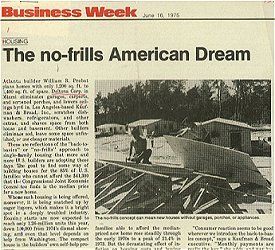
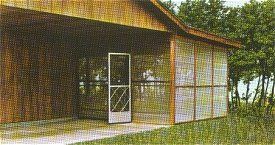
Component Home on Caspian Sea
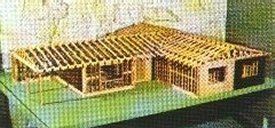
Component Home Model
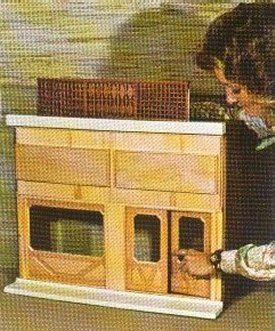
Store Front Model
for Bazaar in Iran
